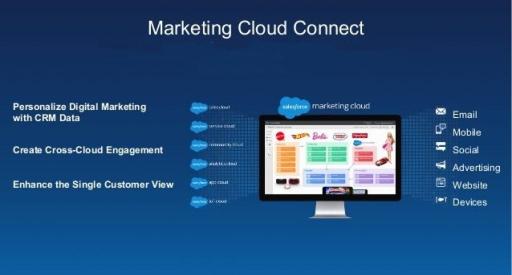- The Marketing Cloud Connect integration provides a comprehensive solution to integrate Salesforce Marketing Cloud with other Salesforce clouds.
- The integration allows for cross-cloud engagement, enabling users in Sales Cloud and Service Cloud to create and send email campaigns directly from those applications.
- The integration offers seamless data sharing and synchronisation between Salesforce clouds, eliminating manual data entry and reducing data discrepancies.
Marketing Cloud Connect is a feature that enables seamless integration between Salesforce Marketing Cloud and Salesforce Sales and Service Clouds. It allows marketers to use customer data and insights from both clouds to create personalised marketing campaigns and deliver targeted messages to customers across multiple channels. This integration allows marketers to access a unified view of customer data, including purchase history, interactions, preferences, and engagement metrics. This enables them to create personalised customer journeys, segment audiences based on behaviour, and trigger automated marketing campaigns based on real-time customer interactions.
Integration with salesforce
The Marketing Cloud Connect integration is a comprehensive solution that integrates with Salesforce to provide a unified view of the customer. It allows for bi-directional data sharing between Salesforce and other cloud applications, ensuring consistent and up-to-date customer data across all Salesforce applications.
The integration also allows for cross-cloud engagement, enabling users in Sales Cloud and Service Cloud to compose and send email campaigns directly from within those applications. Marketing Cloud’s email design capabilities, including access to templates, content blocks, and personalisation features, are utilised to ensure effective communication. Triggered campaigns and journeys can be initiated from within the sales cloud or service cloud, triggering targeted marketing communications.
Audience segmentation and targeting are also integrated into the integration, creating targeted audience segments based on customer data and engagement criteria. Consistent branding and messaging across touchpoints are maintained by leveraging shared content, templates, and brand assets within other Salesforce clouds.
The integration also provides a unified customer experience, providing customers with a seamless and cohesive experience as they interact with different Salesforce clouds. This unified brand identity improves customer satisfaction and loyalty.
The integration also offers a 360-degree view of the customer, allowing for more informed decisions about marketing strategies, sales approaches, and customer service initiatives. Advanced segmentation and personalisation are also available, enabling the creation of highly targeted and personalised marketing segments.

Key features and capabilities
Salesforce Marketing Cloud integrates with other Salesforce clouds, enabling seamless data sharing and synchronisation of customer data. This eliminates the need for manual data entry and reduces the risk of data discrepancies. The integration also allows for real-time or scheduled data updates to ensure data consistency. Cross-cloud engagement is enabled through embedded email creation and sending capabilities within Sales Cloud and Service Cloud, allowing users to compo
se and send email campaigns directly from those applications. Marketing Cloud’s email delivery infrastructure and analytics are utilised to ensure effective communication. Triggered marketing campaigns and customer journeys are initiated from other Salesforce clouds, triggering personalised marketing communications.
A unified customer view is achieved by consolidating customer data from multiple Salesforce clouds, providing a comprehensive customer profile. This 360-degree view of the customer allows organizations to make more informed decisions about marketing strategies, sales approaches, and customer service initiatives. The consolidated customer data is used to create highly targeted and personalized marketing segments, enhancing customer engagement, loyalty, and conversion rates.
The Marketing Cloud Connect integration facilitates seamless integration between Marketing Cloud and other Salesforce clouds, facilitating data synchronization and cross-cloud functionality. Centralized management and control of marketing activities and customer data are provided, allowing organizations to maximize the value of their Salesforce investment.
Use cases and applications
Salesforce offers a range of key use cases and applications, including personalised lead nurturing, targeted account-based marketing (ABM), omnichannel customer journeys, proactive customer retention and upsell/cross-sell, integrated marketing measurement and optimisation, and intelligent customer service and support. Personalised lead nurturing campaigns can be created using unified customer data from Sales Cloud, Service Cloud, and other Salesforce clouds.
These campaigns can be tailored based on lead status, engagement levels, and other data, improving lead conversion rates. Targeted ABM initiatives can be developed based on unique firmographic data, pain points, purchase history, and other insights. Omnichannel customer journeys can be created across multiple Salesforce clouds, ensuring consistent branding, messaging, and content delivery throughout the customer lifecycle.
Proactive customer retention and upsell/cross-sell can be initiated using consolidated customer data, increasing customer loyalty and revenue. Integrated marketing measurement and optimisation can be achieved by analysing customer engagement, conversion, and revenue data from multiple Salesforce clouds.
Also read: Cloud connection: Bridging today’s needs with tomorrow’s innovations
Implementation and configuration
The Salesforce Marketing Cloud integration involves several steps to ensure a secure connection between the Marketing Cloud and other Salesforce clouds. This includes establishing authentication and authorization settings, ensuring user permissions and access controls, and implementing single sign-on (SSO) capabilities.
Data mapping and synchronisation are also crucial, along with a comprehensive data audit and automated processes to keep customer data up-to-date. Audience management and segmentation are also essential, with the ability to define dynamic segments based on customer attributes and behaviors. Automated campaigns and journeys are also implemented, leveraging real-time data and events from the Salesforce ecosystem to trigger personalised communications and experiences. Reporting and analytics capabilities are also implemented, allowing for data-driven decision-making and a comprehensive view of marketing performance.
Cross-functional teams are empowered to access and interpret the integrated data and insights to improve strategies and customer experiences. A comprehensive change management plan is developed to ensure a smooth transition and user adoption of the integrated Salesforce solution. Training and support are provided to marketing, sales, and customer service teams on how to effectively leverage the integrated capabilities. Clear governance structures are established to manage the ongoing maintenance, updates, and optimisation of the integrated system.
Also read: Marketing Cloud Connect: Unifying customer experiences
Best practices and considerations
The integration between Salesforce Marketing Cloud and other Salesforce clouds should align with business objectives, establish comprehensive data governance, ensure a seamless user experience, leverage automation and scalability, implement robust security and compliance, foster cross-functional collaboration, and continuously monitor and optimise the integration.
Defining key business objectives and use cases, conducting a thorough assessment of current processes, and regularly reviewing the integration roadmap are essential steps. Implementing robust data governance policies ensures the quality, security, and compliance of customer data shared across the Salesforce ecosystem. Designing the integrated Salesforce solution with a seamless user experience, conducting user research, usability testing, and iterative design, and providing comprehensive training and support are also crucial.
Adhering to Salesforce’s security best practices and compliance standards is essential, and regular updates are necessary to address evolving threats and vulnerabilities. Establishing a cross-functional team overseeing the integration implementation and ongoing management ensures a cohesive approach and empowers cross-functional teams to make data-driven decisions.

